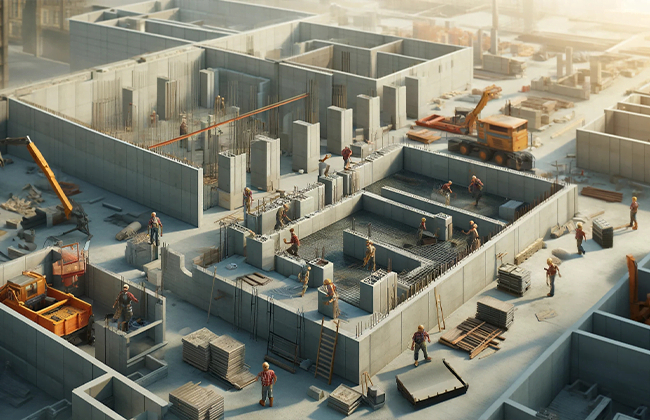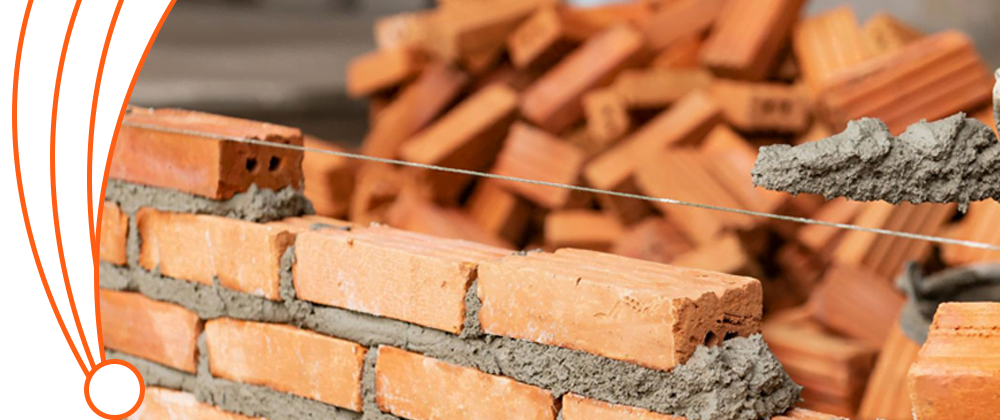Have you ever wondered exactly who does masonry work and what it involves? Masonry work is a crucial aspect of construction, impacting the strength, durability, and appearance of buildings. It involves tasks such as building walls, fireplaces, and patios, and requires skilled professionals to ensure quality results. In this article, we will explore who does masonry work, the skills needed, the benefits of hiring professionals, and the various projects they undertake. Understanding who does masonry work can help you appreciate the craftsmanship and expertise involved in this essential trade.
Table of Contents
What is Masonry Work?
Masonry work involves constructing structures from individual units like bricks, stones, and concrete blocks. These units are often bound together with mortar. The primary focus of masonry work is to create durable and strong structures that can withstand various environmental conditions. Masonry work is used in various construction projects, from residential homes to commercial buildings, and plays a vital role in ensuring the structural integrity and aesthetic appeal of these structures.
Who Does Masonry Work?
Masonry work is performed by skilled professionals who specialize in different types of masonry. Here are some of the key roles in masonry work:
1. Bricklayers
Bricklayers specialize in laying bricks for walls, floors, and other structures. They meticulously align bricks, ensuring they are level and properly spaced. Bricklayers often work on residential and commercial projects, providing essential support for buildings. They use a variety of tools, including trowels and levels, to achieve precise brick placement and ensure that the structure is sturdy and visually appealing. Bricklayers must also have a good understanding of building codes and safety regulations to perform their work correctly.
2. Stone Masons
Stone masons work with natural stones to create aesthetically pleasing and structurally sound surfaces. They cut, shape, and lay stones for walls, floors, and other architectural features. Stone masons are known for their precision and craftsmanship. Working with stones requires skill and experience, as stone masons must be able to select the right stones and fit them together seamlessly. Their work often includes decorative elements that enhance the beauty of a building, making stone masonry both a functional and artistic profession.
3. Concrete Masons
Concrete masons specialize in working with concrete to create foundations, floors, sidewalks, and other structures. They mix, pour, and finish concrete, ensuring it is smooth and level. Their work is critical for the stability and longevity of buildings. Concrete masons use various techniques to shape and finish concrete surfaces, and they must be knowledgeable about the properties of different concrete mixes. Their work often serves as the foundation for other construction activities, making it an essential part of any building project.
4. Tile Setters
Tile setters install tiles on walls, floors, and other surfaces. They work with various materials, including ceramic, porcelain, and marble. Tile setters ensure that tiles are properly aligned and secured, creating visually appealing and functional surfaces. They must be precise in their measurements and cuts to ensure a perfect fit. Tile setters also need to understand the properties of different tile materials and the best methods for installing them. Their work enhances the durability and aesthetic appeal of surfaces in both residential and commercial buildings.
Skills Required for Masonry Work
Masonry professionals need a variety of skills to perform their tasks effectively.
Here are some essential skills:
- Attention to Detail: Precision is crucial in masonry work to ensure the integrity and appearance of structures. Masons must be able to place each brick, stone, or tile accurately to maintain the structure’s stability and aesthetic. A minor mistake in alignment can lead to significant problems, such as weakened walls or uneven surfaces. Therefore, attention to detail is fundamental for quality workmanship.
- Physical Stamina: Masonry work can be physically demanding, requiring strength and endurance. Masons often work in various weather conditions, lifting heavy materials, and performing repetitive tasks that involve bending, lifting, and standing for long periods. Good physical condition is essential to handle the physical stress and avoid injuries on the job.
- Technical Knowledge: Understanding different materials, tools, and techniques is essential for quality work. Masons must know the properties of various building materials, such as bricks, stones, and concrete blocks, and how to use tools like trowels, hammers, and levels effectively. They also need to be familiar with construction methods and building codes to ensure their work meets industry standards.
- Problem-Solving: Masonry professionals often encounter challenges that require quick and effective solutions. These challenges might include dealing with unexpected structural issues, adapting designs to fit onsite conditions, or finding ways to complete tasks more efficiently. Strong problem-solving skills enable masons to overcome obstacles and ensure the project’s success.
Tools and Materials Used in Masonry Work
Masonry workers use a variety of tools and materials to complete their projects. Each tool and material plays a specific role in ensuring the quality and durability of the masonry work.
Common Tools
- Trowels: Trowels are used for spreading mortar and shaping bricks. They come in various shapes and sizes, each suited for different tasks within masonry work.
- Hammers: Masons use hammers to break, cut, and shape bricks and stones. There are different types of hammers, such as brick hammers and sledgehammers, each designed for specific functions.
- Chisels: Chisels are essential for cutting and carving bricks and stones. They allow for precise shaping and detailing, which is crucial for both structural and decorative purposes.
- Levels: Levels ensure that bricks, stones, and other materials are aligned correctly. This tool is vital for maintaining the structural integrity and aesthetic appeal of masonry work.
- Measuring Tapes: Accurate measurements are critical in masonry work. Measuring tapes help masons measure distances and ensure that materials are cut and placed correctly.
Common Materials
- Bricks: Bricks are one of the most common materials used in masonry. They are durable and provide excellent structural support. Bricks come in various types, including clay bricks, concrete bricks, and fly ash bricks.
- Stones: Stones, such as granite, marble, and limestone, are used for both structural and decorative purposes. They offer a natural and timeless appearance to buildings.
- Concrete Blocks: In construction, builders widely use concrete blocks due to their strength and versatility. Builders can use them for foundations, walls, and other structural elements.
- Mortar: Mortar is the binding agent used to hold bricks, stones, and concrete blocks together. It is made from a mixture of cement, sand, and water. Mortar provides stability and ensures that the masonry structure remains intact.
- Tiles: Tiles are used for finishing surfaces, such as floors and walls. They come in various materials, including ceramic, porcelain, and marble, each offering different aesthetic and functional properties.
Table of Tools and Materials
| Tool/Material | Description | Purpose |
| Trowels | Used for spreading mortar and shaping bricks | Ensures proper mortar application and brick placement |
| Hammers | Used for breaking, cutting, and shaping bricks and stones | Allows for precise shaping and detailing |
| Chisels | Used for cutting and carving bricks and stones | Enables detailed and accurate work |
| Levels | Ensures that bricks, stones, and other materials are aligned correctly | Maintains structural integrity and appearance |
| Measuring Tapes | Helps measure distances and ensure materials are cut and placed accurately | Provides accurate measurements for construction |
| Bricks | Durable units used in building walls and other structures | Offers structural support and durability |
| Stones | Natural materials used for structural and decorative purposes | Provides a natural and aesthetic look |
| Concrete Blocks | Versatile blocks used in foundations and walls | Offers strength and versatility |
| Mortar | Binding agent made from cement, sand, and water | Ensures stability and integrity of masonry work |
| Tiles | Finishing materials used on floors and walls | Provides aesthetic and functional surfaces |
The Process of Masonry Work

Understanding the process of masonry work helps appreciate the skills and efforts involved in creating durable and aesthetically pleasing structures. Let’s dive into the key steps in this process.
Planning and Preparation
The first step in masonry work is thorough planning and preparation. This involves several essential activities:
- Site Assessment: Masons assess the site to understand the ground conditions and identify any potential challenges. They check the soil stability, drainage, and other environmental factors that could impact the construction.
- Measuring Materials: Accurate measurements are crucial. Masons measure the area to determine the quantity of materials needed, ensuring there is enough supply to avoid delays.
- Preparing the Foundation: Before laying the foundation, you prepare the ground by clearing debris, leveling the surface, and sometimes compacting the soil. This step ensures that the foundation will be stable and durable.
Proper planning and preparation ensure that the project proceeds smoothly and efficiently, reducing the risk of errors and delays.
Laying the Foundation
A strong foundation is crucial for any masonry project. This step includes:
- Mixing and Pouring Concrete: For concrete foundations, masons mix concrete to the right consistency and pour it into prepared molds or forms. They ensure the concrete is level and properly set.
- Using Other Materials: Depending on the project, foundations can also be made from stones or bricks. Masons carefully place these materials, ensuring they are level and secure.
- Ensuring Stability: Once the foundation is laid, it needs time to cure and gain strength. Masons monitor the curing process to ensure the foundation remains undisturbed.
Laying a robust foundation is essential to support the structure’s weight and ensure its long-term stability.
Constructing the Structure
Once the foundation is in place, masonry workers begin constructing the structure. This step involves:
- Laying Bricks, Stones, or Concrete Blocks: Masons lay these materials in a specific pattern, using mortar to bind them together. They follow the design plans precisely, ensuring each layer is level and properly aligned.
- Checking Alignment and Level: Masons continuously check the alignment and level of the materials. They use tools like levels and measuring tapes to ensure accuracy.
- Building Upwards: The construction progresses layer by layer, with masons taking care to align each new layer with the previous ones. This meticulous process ensures the structure’s integrity and strength.
Finishing Touches
The final step in masonry work is adding finishing touches to enhance both functionality and aesthetics:
- Applying Sealants: Sealants are applied to protect the structure from moisture and other environmental factors. This step helps in extending the life of the masonry work.
- Cleaning the Surface: Masons clean the surface to remove any excess mortar, dust, or debris. A clean finish enhances the visual appeal of the structure.
- Performing Touch-Ups: Any minor imperfections are addressed during this stage. Masons make sure that the structure looks polished and professional.
The goal of these finishing touches is to ensure that the structure is both functional and visually appealing, meeting the standards of quality and craftsmanship.
Benefits of Hiring Professional Masonry Workers
Hiring professional masonry workers offers several significant benefits, ensuring that your construction projects are completed to the highest standards. Let’s delve into these benefits in more detail:
1. Expertise
Professional masonry workers bring extensive knowledge and experience to their projects. Training in the latest techniques and methods allows them to tackle a variety of tasks effectively. Their expertise ensures that they perform the masonry work correctly, adhering to industry standards and building codes. This expertise minimizes the risk of errors, ensuring a safe and secure structure.
2. Efficiency
Experienced masonry workers can complete projects quickly and efficiently. They have honed their skills over years of practice, which allows them to work faster without compromising on quality. Their familiarity with tools and materials means they can execute tasks smoothly, avoiding common pitfalls that can delay a project. This efficiency not only saves time but also reduces labor costs, making professional masonry work a cost-effective option.
3. Durability
Quality masonry work ensures the longevity and stability of structures. Professional masons use high-quality materials and proven techniques to construct durable buildings that can withstand various environmental conditions. Their meticulous attention to detail helps prevent structural issues such as cracks and moisture penetration, which can compromise the integrity of the building. Investing in professional masonry work means investing in a structure that will stand the test of time.
4. Aesthetics
Skilled masons can create visually appealing designs that enhance the overall appearance of buildings. Whether it’s a residential home or a commercial property, the aesthetic quality of masonry work can significantly impact its value and appeal. Professional masons are adept at working with different materials, such as bricks, stones, and tiles, to create beautiful and intricate patterns. Their craftsmanship ensures that the final product is not only functional but also a work of art.
Summary Table of Benefits
| Benefit | Description |
| Expertise | Knowledge and experience to perform high-quality work, adhering to industry standards and codes. |
| Efficiency | Ability to complete projects quickly and efficiently, reducing time and labor costs. |
| Durability | Ensures longevity and stability of structures, preventing issues like cracks and moisture damage. |
| Aesthetics | Creates visually appealing designs that enhance the appearance and value of buildings. |
Choosing the Right Masonry Professional
Selecting the right masonry professional is essential for ensuring that your project is completed to the highest standards. Here are some key factors to consider when making your choice:
1. Experience
Experience is one of the most important factors when choosing a masonry professional. Look for professionals with a proven track record in masonry work. Experienced masons have encountered various challenges and developed the skills needed to handle different types of projects efficiently. Their expertise ensures that the work will be done correctly and to a high standard.
2. References
Asking for references or checking online reviews can provide valuable insights into the quality of a mason’s work. Speaking with past clients or reading their reviews can help you gauge the mason’s reliability, work ethic, and the overall satisfaction of their clients. Positive feedback from previous customers is a good indicator that the mason is trustworthy and competent.
3. Licensing and Insurance
Ensuring that the mason is licensed and insured is crucial to protect yourself from any potential liabilities. A licensed mason has met the required standards and regulations set by the industry, which is a testament to their qualifications. Insurance is equally important, as it covers any accidents or damages that might occur during the project. This protection gives you peace of mind knowing that you are not financially responsible for unforeseen incidents.
4. Portfolio
Reviewing a mason’s portfolio allows you to see examples of their previous work. A comprehensive portfolio showcases the mason’s range of skills and the types of projects they have completed. Look for consistency in quality and attention to detail in their work. A strong portfolio indicates that the mason takes pride in their craft and can deliver results that meet your expectations.
Common Masonry Projects
Masonry work encompasses a wide range of projects, each requiring specific skills and techniques. Here are some of the most common masonry projects:
Residential Homes
Masonry is frequently used in the construction and enhancement of residential homes. Here are some key areas where masonry is applied:
- Building Walls: Masons construct sturdy and attractive walls using bricks, stones, or concrete blocks. These walls can be load-bearing or simply decorative, adding both function and beauty to a home.
- Fireplaces: Masonry fireplaces are not only functional but also serve as a focal point in living spaces. Skilled masons design and build fireplaces that are safe, efficient, and aesthetically pleasing.
- Patios: Creating outdoor patios with bricks or stones provides a durable and stylish outdoor living space. Masons ensure that the patio is level and properly drained to prevent water damage.
- Walkways: Masonry walkways enhance the landscape and provide a practical pathway through gardens and yards. They are built to withstand foot traffic and weather conditions, adding value to the property.
Commercial Buildings
In commercial construction, masonry is used for its durability and aesthetic appeal. Here are some common applications:
- Constructing Facades: The façade of a commercial building often features masonry for a professional and robust appearance. Masons use various materials to create impressive and lasting exteriors.
- Retaining Walls: These walls are essential for managing soil erosion and leveling landscapes. Masons construct retaining walls that are both functional and visually appealing, often incorporating decorative elements.
- Decorative Elements: Masonry adds character to commercial buildings through decorative elements such as columns, arches, and intricate brickwork. These features enhance the building’s overall design and attractiveness.
Restoration
Masonry restoration is critical for preserving historical buildings and maintaining their original charm. This involves:
- Repairing Damages: Masons repair cracks, replace damaged bricks or stones, and address structural issues. This work requires precision to ensure that the repairs blend seamlessly with the original construction.
- Restoring Features: Historical buildings often have unique masonry features that need careful restoration. Masons work to restore these features, preserving the building’s heritage and architectural integrity.
- Cleaning and Repointing: Over time, masonry can become dirty and the mortar joints may deteriorate. Masons clean the surfaces and repoint the mortar, ensuring the building’s longevity and aesthetic appeal.
Landscaping
Masonry is widely used in landscaping to create functional and beautiful outdoor spaces. Common projects include:
- Garden Walls: Masons build garden walls to define spaces, create privacy, and add visual interest to landscapes. These walls are designed to complement the natural surroundings.
- Steps: Masonry steps provide safe and durable access to different levels of a garden or yard. They are constructed to blend seamlessly with other landscaping elements.
- Water Features: Masons create stunning water features such as fountains and ponds. These features add a tranquil and decorative element to outdoor spaces, enhancing the overall ambiance.
Cost of Masonry Work
Understanding the cost of masonry work is essential for planning and budgeting your construction projects. The cost can vary widely based on several factors, including the project’s size, complexity, materials used, and the location. Here’s a detailed breakdown of the factors affecting the cost and the average price range you can expect.
Factors Affecting Cost
- Project Size: Larger projects typically cost more due to the increased amount of materials and labor required. However, larger projects might benefit from economies of scale, potentially lowering the cost per square foot.
- Complexity: More complex designs and structures require skilled labor and more time to complete, increasing the overall cost. Intricate patterns, arches, or detailed stonework are examples of complex masonry projects.
- Materials Used: Different materials come with different price points. For instance, natural stone is usually more expensive than brick or concrete blocks. Additionally, high-quality materials, while more costly, often provide better durability and aesthetic appeal.
- Labor Costs: Labor costs can vary significantly depending on the region and the mason’s experience and reputation. Skilled masons with extensive experience may charge higher rates, but they often deliver superior quality work.
- Site Preparation: The condition of the site can also impact costs. If you need significant preparation, such as clearing debris, leveling the ground, or addressing drainage issues, these additional tasks will increase the total cost.
Average Cost Breakdown
Here is a detailed table showing the average cost range for different types of masonry projects:
| Project Type | Cost Range (per square foot) | Description |
| Brickwork | $10 – $20 | Building walls, fireplaces, patios, and walkways with bricks. |
| Stone Masonry | $20 – $30 | Constructing walls, floors, and decorative elements with natural stone. |
| Concrete Block Masonry | $10 – $15 | Using concrete blocks for foundations, walls, and other structural elements. |
| Tile Setting | $15 – $25 | Installing tiles on floors, walls, and other surfaces. |
| Restoration Work | $20 – $40 | Repairing and restoring historical buildings, which often requires specialized skills and materials. |
| Retaining Walls | $20 – $30 | Building retaining walls to manage soil erosion and landscaping features. |
Tips for Managing Costs
- Get Multiple Quotes: Always get quotes from several masonry professionals to compare prices and services. This helps you understand the market rate and avoid overpaying.
- Plan Thoroughly: Detailed planning can help avoid unexpected expenses. Ensure that all aspects of the project are clearly outlined before work begins.
- Choose Materials Wisely: Opt for materials that fit your budget while meeting your project’s durability and aesthetic needs. Sometimes, alternative materials can offer significant savings without compromising quality.
- Schedule Wisely: If possible, schedule your masonry work during off-peak times. Some masons may offer lower rates during these periods.
Maintenance of Masonry Work
Maintaining masonry structures is crucial for their longevity and aesthetic appeal. Regular maintenance helps prevent deterioration and ensures that the structure remains safe and functional. Here are some essential maintenance tasks:
Cleaning
Regular cleaning is essential to remove dirt, mold, and stains from the surface of masonry structures. Over time, these elements can accumulate and cause the masonry to look unattractive and potentially weaken. Cleaning involves:
- Using Mild Detergents: Gentle cleaning solutions help remove surface dirt without damaging the masonry.
- Power Washing: For tougher stains, a power washer can be used to clean bricks, stones, and concrete blocks. However, it’s important to use the correct pressure settings to avoid damaging the material.
- Removing Mold and Mildew: Mold and mildew can grow on masonry surfaces, especially in damp environments. Using appropriate cleaning solutions can help eliminate these growths and prevent them from returning.
Sealing
Applying sealants is a proactive way to protect masonry structures from water damage. Water can seep into the masonry, causing cracks, stains, and structural weakness. Sealing involves:
- Selecting the Right Sealant: Different types of sealants are available for various masonry materials. It’s crucial to choose a sealant that is compatible with the specific type of brick, stone, or concrete.
- Applying the Sealant: Typically, you apply the sealant using a brush, roller, or sprayer. You should apply it evenly to cover the entire surface and allow it to dry completely for maximum protection.
- Reapplying as Needed: Sealants can wear off over time, especially in harsh weather conditions. Regular reapplication ensures continued protection against moisture.
Inspection
Regular inspections are vital for identifying potential issues before they become major problems. Inspections should focus on:
- Checking for Cracks: Small cracks can expand over time, leading to significant structural issues. Identifying and repairing cracks early can prevent further damage.
- Examining Mortar Joints: The mortar that holds masonry units together can deteriorate, leading to loose or dislodged bricks or stones. Inspecting mortar joints helps ensure they remain intact and secure.
- Assessing Overall Condition: Look for signs of wear and tear, such as spalling (flaking or peeling of the surface), efflorescence (white, powdery residue), and uneven settling.
Repointing
Repointing is the process of replacing old or damaged mortar between bricks or stones. This maintenance task is essential for maintaining the structure’s integrity and involves:
- Removing Old Mortar: The damaged mortar is carefully removed using specialized tools. It’s important to remove just enough to allow for the new mortar to adhere properly without damaging the masonry units.
- Mixing New Mortar: A new batch of mortar is mixed to match the existing mortar in color and composition. This ensures a consistent appearance and compatibility with the original material.
- Applying New Mortar: Using a trowel, the new mortar is applied to the joints. The masons press it firmly into the joints and smooth it out to create a uniform surface.
- Curing: The new mortar needs time to cure and harden properly. During this time, you should keep it moist to prevent premature drying and cracking.
Conclusion:
In conclusion, understanding who does masonry work is vital for anyone planning a construction or renovation project. Professional masons bring expertise, efficiency, and quality to their work, ensuring durable and aesthetically pleasing results. Whether it’s building a new fireplace, restoring a historical building, or creating beautiful garden walls, knowing who does masonry work helps you make informed decisions. If you are looking for a professional contractor for masonry work, contact (+1) 917-355-8556. They can provide the skills and experience needed to achieve the best results for your project.
FAQs:
Q: Who does masonry work for residential homes?
A: Skilled masons perform masonry work for residential homes, building walls, fireplaces, patios, and walkways. These professionals ensure that the structures are not only durable but also aesthetically pleasing, enhancing the home’s overall value.
Q: Who does masonry work for commercial buildings?
A: Skilled masons handle masonry work for commercial buildings. They construct facades, retaining walls, and decorative elements that contribute to the building’s strength and visual appeal. Their expertise ensures that commercial projects meet both functional and aesthetic requirements.
Q: Who does masonry work for historical building restoration?
A: Specialized masons who focus on restoration projects perform masonry work for historical buildings. They carefully repair and restore old structures, maintaining their original charm and structural integrity. Their work helps preserve historical landmarks for future generations.
Q: Who does masonry work for landscaping projects?
A: Landscape masons do masonry work for landscaping projects, creating garden walls, steps, and water features. They use their skills to enhance outdoor spaces, making them both functional and beautiful. Their work adds value and enjoyment to any property.
Q: Who does masonry work for tile installation?
A: Tile setters, a type of mason, perform masonry work for tile installation. They install tiles on floors, walls, and other surfaces, ensuring proper alignment and a secure fit. Their precision ensures that tiled surfaces are durable and visually appealing.




